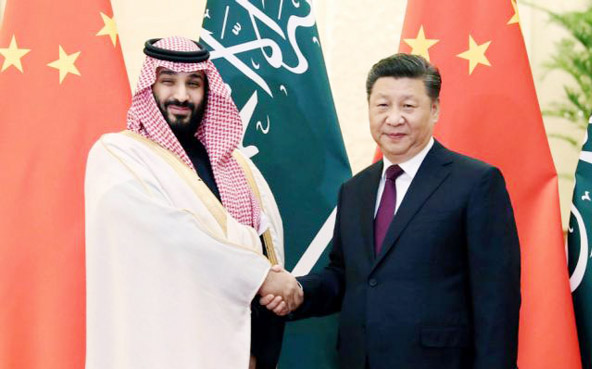
The Telegraph :
“China has the right to carry out anti-terrorism and de-extremisation work for its national security,” Prince Mohammed, who has been in China signing multi-million trade deals much to the annoyance of his Western allies, was quoted as saying on Chinese state television.
Xi Jinping, China’s leader, told the crown prince the two countries must strengthen international cooperation on de-radicalisation to “prevent the infiltration and spread of extremist thinking”.
China has detained an estimated one million Uighur Muslims in concentration camps, where they are undergoing re-education programmes allegedly intended to combat extremism.
The Uighur are an ethnic Turkic group that practices Islam and lives in Western China and parts of Central Asia.
Beijing has accused the minority in its Western Xinjiang region of supporting terrorism and implemented a surveillance regime.
Uighur groups had appealed to Saudi’s powerful young prince to take up their cause, as the ultraconservative kingdom has traditionally been a defender of the rights of Muslims worldwide.
But Muslim leaders have so far not broached the issue with China, which has in recent years become an important trading partner with the Middle East.
Recep Tayyip Erdogan, Turkey’s president, became the first to condemn Beijing, however, describing China’s treatment of its Uighur population as “a great cause of shame for humanity” last month and asking it to close the “concentration camps”.
Turkish President Recep Tayyip Erdogan had once accused China of “genocide” but has since established closer diplomatic and economic relations with Beijing.
Imran Khan, prime minister of Pakistan, where Prince Salman has just visited, said he “did not know” much about the conditions of the Uighurs.
Mohammed arrived in Beijing on Thursday following visits to Pakistan and India, showing the world that his country still has allies after the grisly murder of Saudi journalist Jamal Khashoggi at the kingdom’s Istanbul consulate.
“China is a good friend and partner to Saudi Arabia,” Xi told Mohammed in a meeting in the Great Hall of the People.
“Saudi Arabia’s relations with China can be traced back a very long time in the past,” the crown prince said.
“Over such a long period of exchanges with China, we have never experienced any problems with China.”
He met with Chinese Vice Premier Han Zheng earlier on Friday.
“Is the crown prince’s tour symbolic of Saudi Arabia’s pivot to the East? Yes,” Najah al-Otaibi, a senior analyst at the pro-Saudi think-tank Arabia Foundation, told AFP.
“Riyadh wants to strengthen alliances in Asia-especially now with the continuing fallout with the United States over Khashoggi’s murder and other issues, and attempts by the EU to put Riyadh on a blacklist over money laundering allegations.”
Khashoggi, a fierce critic of the prince, was killed at the Saudi consulate in Istanbul in October, a murder that tarnished the image of the kingdom and of the crown prince in particular.
“China has the right to carry out anti-terrorism and de-extremisation work for its national security,” Prince Mohammed, who has been in China signing multi-million trade deals much to the annoyance of his Western allies, was quoted as saying on Chinese state television.
Xi Jinping, China’s leader, told the crown prince the two countries must strengthen international cooperation on de-radicalisation to “prevent the infiltration and spread of extremist thinking”.
China has detained an estimated one million Uighur Muslims in concentration camps, where they are undergoing re-education programmes allegedly intended to combat extremism.
The Uighur are an ethnic Turkic group that practices Islam and lives in Western China and parts of Central Asia.
Beijing has accused the minority in its Western Xinjiang region of supporting terrorism and implemented a surveillance regime.
Uighur groups had appealed to Saudi’s powerful young prince to take up their cause, as the ultraconservative kingdom has traditionally been a defender of the rights of Muslims worldwide.
But Muslim leaders have so far not broached the issue with China, which has in recent years become an important trading partner with the Middle East.
Recep Tayyip Erdogan, Turkey’s president, became the first to condemn Beijing, however, describing China’s treatment of its Uighur population as “a great cause of shame for humanity” last month and asking it to close the “concentration camps”.
Turkish President Recep Tayyip Erdogan had once accused China of “genocide” but has since established closer diplomatic and economic relations with Beijing.
Imran Khan, prime minister of Pakistan, where Prince Salman has just visited, said he “did not know” much about the conditions of the Uighurs.
Mohammed arrived in Beijing on Thursday following visits to Pakistan and India, showing the world that his country still has allies after the grisly murder of Saudi journalist Jamal Khashoggi at the kingdom’s Istanbul consulate.
“China is a good friend and partner to Saudi Arabia,” Xi told Mohammed in a meeting in the Great Hall of the People.
“Saudi Arabia’s relations with China can be traced back a very long time in the past,” the crown prince said.
“Over such a long period of exchanges with China, we have never experienced any problems with China.”
He met with Chinese Vice Premier Han Zheng earlier on Friday.
“Is the crown prince’s tour symbolic of Saudi Arabia’s pivot to the East? Yes,” Najah al-Otaibi, a senior analyst at the pro-Saudi think-tank Arabia Foundation, told AFP.
“Riyadh wants to strengthen alliances in Asia-especially now with the continuing fallout with the United States over Khashoggi’s murder and other issues, and attempts by the EU to put Riyadh on a blacklist over money laundering allegations.”
Khashoggi, a fierce critic of the prince, was killed at the Saudi consulate in Istanbul in October, a murder that tarnished the image of the kingdom and of the crown prince in particular.

